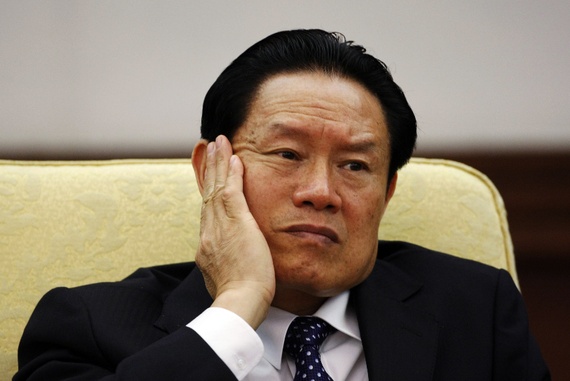The Atlantic’s Matt Schiavenza argues that politics (not corruption) best explains the downfall of China’s ex-security chief, Zhou Yongkang, who awaits a formal indictment under house arrest after authorities seized $14.5 billion in assets from his friends and associates who have been ensnared in a widening graft probe:
But despite the scale of the case against Zhou and his network, his downfall may have little to do with corruption at all. In the end, Zhou Yongkang’s larger crime will have been running afoul of Xi Jinping, who has already established himself as arguably China’s most powerful leader in decades.
In a country without a free press, an independent judiciary, or elections to hold officials accountable, corruption across all levels of government is systematic. Chinese officials are paid meager salaries, yet investigations by Bloomberg and The New York Times over the past two years have revealed just how wealthy government leaders and their families have become. And rather than empower the country’s media and activists to police corruption, Xi Jinping has repressed criticism more than any other Chinese leader in decades.
Instead, Zhou Yongkang’s problems are almost purely the result of maneuverings within elite Chinese politics. Far from being the unified monolith of popular imagination, the Communist Party consists of powerful factions that compete with one another for important government posts. Xi Jinping, the son of a senior Party official, belongs to the “princeling” faction, while Li Keqiang, China’s premier, is affiliated with officials who got their start in the Communist Youth League. Their accession to China’s top two positions was assured in 2007, when they were introduced as vice president and vice premier during a carefully orchestrated procession. But when the Standing Committee voted to strip Bo Xilai of his position as Chongqing’s party secretary, Zhou cast the lone dissenting vote. Soon, rumors began to swirl that Zhou had plotted to upend Xi’s accession to power and install Bo, instead, as president-to-be. In August of last year, one month after Bo Xilai’s conviction, China launched an investigation into the newly retired Zhou. He was last seen in public two months later. [Source]
For the Chinese Communist Party, building a corruption case against a top Chinese official is a delicate science. Accuse them of too paltry an embezzlement, and it makes the charges seem like petty infighting. On the other hand, accuse them of “robbing the state and devastating the people,” as the expression goes — and it casts doubt on the establishment for allowing such massive looting to occur. The Goldilocks amount justifies the purge while maintaining the integrity of the system that husbands it. [Source]
Read more about Zhou Yongkang via CDT.








